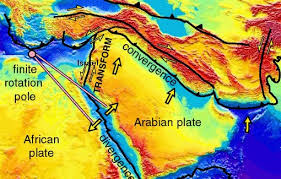Middle East
The Middle East has a complex geologic history spanning millions of years. Here are some key events and processes that have shaped the region:
Formation of the Arabian Plate: The Arabian Plate is the largest tectonic plate in the Middle East and is made up of several smaller plates that merged over millions of years. The process of plate tectonics began around 200 million years ago, when the supercontinent of Pangaea began to break apart. As the Arabian Plate formed, it collided with the Eurasian Plate, which created the Zagros Mountains in Iran.
Formation of the Tethys Sea: During the Mesozoic Era (about 252 to 66 million years ago), the Middle East was covered by a shallow sea known as the Tethys Sea. This sea was home to a diverse array of marine life, including ammonites, belemnites, and ichthyosaurs.
Formation of oil and gas deposits: As the Tethys Sea began to retreat, the Middle East became a hot, dry desert. Over time, organic matter from plants and animals that lived in the sea became buried under sediment and were transformed into oil and gas deposits.
Formation of the Zagros Fold Belt: The Zagros Mountains in Iran were formed as a result of the collision between the Arabian and Eurasian Plates. This collision caused the sedimentary rocks to buckle and fold, forming the Zagros Fold Belt.
Volcanic activity: The Middle East has a number of active and dormant volcanoes, including Mount Ararat in Turkey and Mount Damavand in Iran. These volcanoes were formed as a result of magma rising up from the Earth's mantle and breaking through the Earth's crust.
Human impact: In more recent times, human activity has had a significant impact on the geology of the Middle East. Overgrazing, deforestation, and the construction of dams and irrigation systems have all contributed to soil erosion and desertification.
The geologic history of the Middle East is a complex and fascinating subject, with many different processes and events shaping the region over millions of years.

Comments
Post a Comment